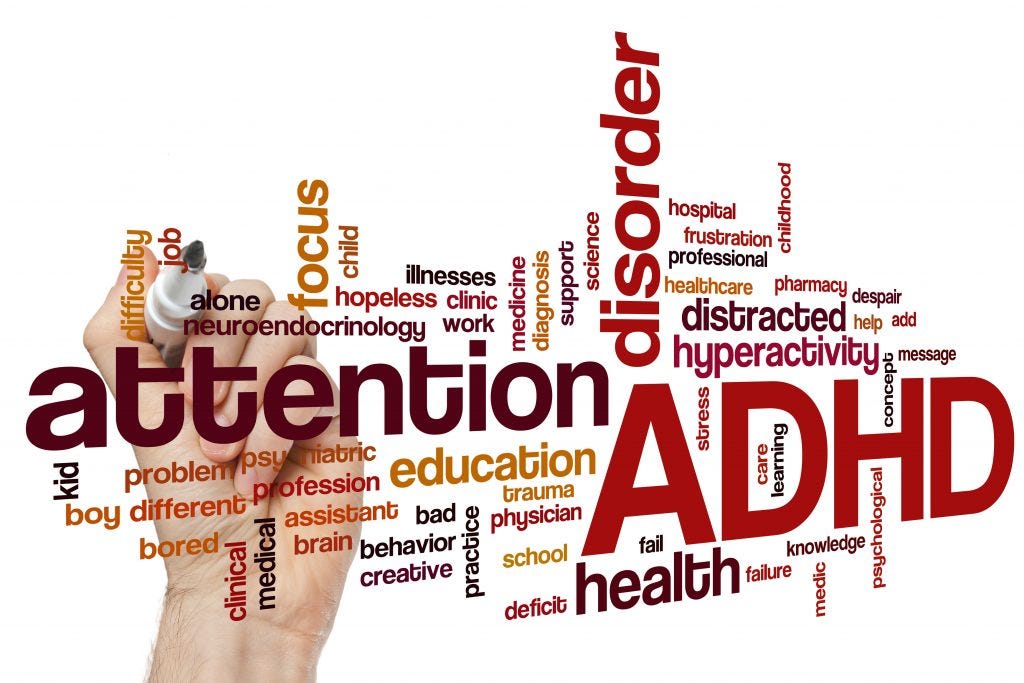Best Approach to Adult ADHD (ADD)
Integrative Psychiatry, medicine, and holistic therapies can inform and help ADHD
ADHD (Attention-deficit/hyperactivity disorder) also referred to as ADD (Attention-deficit disorder) often is very disruptive to adult life, which can impact on:
career,
relationships,
self-esteem,
mental and physical health,
getting things done.
Adults with ADHD can experience impairment, discrimination, and disability.
ADHD symptoms can lead to significantly compromised performance at work, in family life, in social activity and can contribute to substance abuse. Having ADHD can be more
problematic when an individual finds himself (or herself — gender assumed) in an adverse work or life situation when he feels there are no other choices or options. Ill health can develop from being chronically overextended, not getting adequate sleep or from continued stress.
There can be major discrimination against people with ADHD in work, academic and social situations; however, ADHD in all forms — from minor to severe — is common in our population. It is important to recognize that for many it is not a disability or disorder, though at times a struggle. When people with ADHD are in a positive fit with their life situation and operating within their capacity, they are some of our most creative, talented, and productive citizens.
What is ADHD?
There are many conditions that can masquerade and significantly contribute to ADHD expression and difficulties. Helpful information gathering or consultation can guide treatment and recovery, especially where there hasn't been a good response to simple or conventional approaches.
Get familiar with natural, holistic approaches and what they may have to offer compared to conventional treatments. Discover any underlying factors or conditions that may need attention. There are many difficulties for the adult when this condition is unrecognized and untreated.
The age of recognition in adults is around forty, though it must be present to some degree since age seven or younger for diagnosis. After age twelve, it is estimated that about a half of children will continue with ADHD symptoms into adulthood, usually of the inattentive type – as difficulties with organizing, sustaining attention, distraction, finishing tasks, procrastination, losing things, forgetfulness, and making mistakes.
Commonly seen hyperactivity-impulsivity symptoms in children and adolescents are either less likely to be seen or appear differently in adults. Children and adolescents with difficulties fidgeting, feeling settled, relaxing quietly, talking excessively, intruding into the conversation, blurting out answers, or running & climbing dangerously could present in adults as internal restlessness, substance abuse. Other symptoms as hyperactivity, difficulties with decision making, and poor impulse control could also be present. See the following links for further information: ADDA, Adult ADD Univ. of Maryland questionnaire, and Web MD.
ADHD occurrence and types:
ADHD occurs in an estimated 4% to 5% of the adult population (varies in different studies, but is more common than has been assumed). It is often discussed in terms of three subtypes according to what symptoms predominate: 1. inattentive 2. hyperactivity-impulsivity 3. combination of 1 & 2 (more common in adults). see stats.
ADHD is a highly inheritable condition passed from parent to child. Scientists have documented brain imaging and brain chemical transmission studies which clearly show that biological differences account for behavioral or attentional characteristics of ADHD. See 7 types ADD by Dr. Amen.
There are many natural and conventional treatment options.
Conventional treatments for ADHD are often with psycho-stimulant medication like Ritalin, Concerta, or Adderall; or antidepressants as Wellbutrin or less commonly used agents as Atomoxetine (Strattera), Clonidine, or Tenex. However, the over-prescribing of these substances has been called into question – whether the drugs are really needed or indicated in most cases. Concerns have been raised about the potential adverse long-term effects as well — see helpguide.org.
The biggest issues in using these medications are:
When other safer and more natural approaches may be available
When medication are used ahead of careful examination for other causes or contributing factors
Mark improvement is possible when other causes or contributing factors are addressed in a person with ADHD
Contributing factors that may be overlooked include: 1. medication side effects 2. drug abuse and chemical dependency 3. medical condition as: hyperthyroidism, hypothyroidism, hidden infection, inflammatory diseases, or nutritional deficiencies 4. mood disorders as bipolar disorder, depression and anxiety 5. Post Traumatic Stress Disorder (PTSD) or past trauma 6. environmental allergies and sensitivities 7. family disruption or dysfunction 8. major loses
Natural approaches and holistic therapies:
These can be considered once underlying causes or contributing factors have been identified and addressed.
There are many things offered and available, some with a better track record and less controversy than others. After you do your research from reputable sources consider:
identifying environmental illness and sensitivities and treating allergies
improving nutrition with optimal diet with more organic, fresh whole foods, considering supplements as fish oil (omega 3's), magnesium, zinc, B-vitamins as B6, folic acid, melatonin, or iron if indicated - click on following numbers to read more: 1 & 2.
avoiding food additives, chemicals, refined sugars, overly processed food
ADHD coaching
Seeking accommodations when needed in educational and organizations settings
behavioral cognitive, family, or other holistic therapies, to help modify dysfunctional patterns of interaction or behavior
EEG Biofeedback
It is recommended that if any if these approaches are considered that they be done under the careful supervision of a qualified holistic healthcare practitioner.
ADHD or other problems presenting like ADHD can be recognized hopefully by you with the information presented here or through some of the linked references. Potential problems with the unrecognized or untreated condition can be considerable. Consider the assessment and treatment approaches offered by Integrative psychiatry, medicine and holistic therapy practitioners. Further reading re: ADD Resources - ADD R. Recent review available for purchase: ADHD IN CHILDREN AND ADULTS, Audio-Digest Psychiatry, Volume 44, Issue 16, August 21, 2015, Managing ADHD in Preschoolers – Robert R. Althoff, MD, PhD, Adult ADHD – James Margolis, MD.
Article by Ron Parks, MD and edited by Shan Parks August 2015


